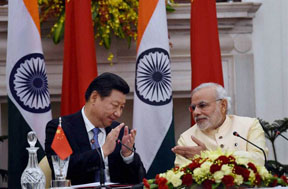 BEIJING: As China looks to step up its investments in India after President Xi Jinping’s first visit, India is wooing major Chinese financial institutions like the sovereign wealth funds, which can potentially invest billions of dollars in the lucrative Indian stock market.
BEIJING: As China looks to step up its investments in India after President Xi Jinping’s first visit, India is wooing major Chinese financial institutions like the sovereign wealth funds, which can potentially invest billions of dollars in the lucrative Indian stock market.
“If you look at the Asia story, economies like India are definitely a significant piece of economic growth in this entire sub-continent. It makes a lot of rational sense for them to think about India,” Chitra Ramkrishna, the MD and CEO of the National Stock Exchange (NSE), said making a case for Chinese firms to begin investing in Indian stock markets.
A lot of bilateral discussions have taken place between the two countries in this regard, she said.
One of the bilateral meetings she had was with the Shenzhen stock exchange President and CEO Liping Song.
“We are working with the Chinese specifically to see if there are any road blocks. Prima-facie the whole Foreign institutional framework in India is very welcoming,” Chitra told PTI in an interview.
Chitra was here on a visit to attend a key conference in which she spoke on the ‘role of stock exchanges in China’s financial reform’.
She was replying to a question on whether China is getting interested to explore opportunities to allow big sovereign wealth funds like the China Investment Corporation (CIC) which is sitting on a corpus of over USD 650 billion to invest in India.
“It is beginning to happen especially with high-level dialogue between the two countries. The high-level dialogue always triggers more broad based interest in countries. This will start to happen,” she said, replying to a question about prospects of Chinese investments in Indian stock markets which showed signs of bouncing back in recent months.
During the just concluded visit of Xi to India, China has committed to invest USD 20 billion in two industrial parks as well as in the modernization of Indian Railways.
“In terms of India’s growth story and the new set of economic growth parameters set out by the new government, the appetite for new investment is tremendous,” she said.
“The kind of returns the Indian markets can offer is always on the upper quartile compared to most destinations in Asia. So it is a good diversification for Chinese investments to think about investments in India,” she said. About the prospects of big inflows of Foreign Direct Investment (FDI) or FII investments into India, Chitra said, “among the big changes that have been brought in India is the new regulatory framework for foreign investors to invest in the Indian markets.”
“Because of the foreign portfolio investor framework, access has become significantly simplified. Registration and KYC norms have become much easier,” she said.
“For big players like sovereign wealth funds and state investment corporations and so on, accessing India has become much simpler. We are getting very good feedback from several other destinations,” she said.
“The number and volumes coming from foreign investors or foreign portfolio investors is fairly high in the Indian markets. This will improve the ability for several others to come to India. So we are expecting volumes to grow in the coming years as the new framework is understood and appreciated more,” she said.
At the Conference of the International Finance Corporation in China, she said, “there was a lot of cross market learning between emerging countries”.
“There is a lot to learn from each other. India has done reasonably well on the markets front. Direct investment is where China has done pretty well. Each country has its own set of sequencing what they want to focus on, but in the ultimate analysis we have to do everything,” she said.
India’s decision to go with market reforms first has paid off, she said. “You can see a good amount of investment flows into India through the markets.”
Chitra also allayed concerns of foreign investors in India or potential investors over GAAR.
“There is a lot of clarity available. The clarity has been sought and provided. I would say there is certainty in the framework,” she said, adding that a tax certainty and clarity that was being sought by people has been provided for.
Asked whether NSE is looking for tie-ups with Shanghai, Shenzen and Hong Kong stock exchanges similar to the partnerships with exchanges like Singapore and Chicago Mercantile exchange, where NIFTY linked products are trading, she said: “we would love to do that. Ultimately NIFTY is a proxy of the Indian markets. We can find several areas of cooperation”.
“Importantly NIFTY is really a barometer of Indian markets. If there is one asset class which can be useful for a Chinese investor to put his investments in India that should be in NIFTY. We will be happy to explore,” she said.–PTI






